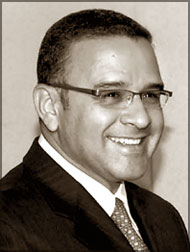One more Left turn
Jayatilleke de Silva
| ‘El
Salvador is a small country in Central America bordering the
Pacific Ocean, Guatemala, Honduras and Venezuela. Its
population is 7.1 million, which is slightly bigger than
third of the population of Sri Lanka.’ |
 There is one more Left turn in the Americas. Last Sunday people of El
Salvador elected Mauricio Funes (49) of the Farabundo Marti National
Liberation Front (FMLN) as their President with an absolute majority.
This continues a Leftward shift of power in Latin American countries
which started with the victory of Hugo Chavez in the Presidential
elections in Venezuela in 1996. There is one more Left turn in the Americas. Last Sunday people of El
Salvador elected Mauricio Funes (49) of the Farabundo Marti National
Liberation Front (FMLN) as their President with an absolute majority.
This continues a Leftward shift of power in Latin American countries
which started with the victory of Hugo Chavez in the Presidential
elections in Venezuela in 1996.
El Salvador is a small country in Central America bordering the
Pacific Ocean, Guatemala, Honduras and Venezuela. Its population is 7.1
million, which is slightly bigger than third of the population of Sri
Lanka.
Mauricio Funes is an influential media personality with more than 20
years experience. In 1994 he was awarded the Maria Moors Cabal Prize
from the Columbia University.
Funes won in a four-cornered contest in which his principal opponent
was Rodrigo Avila of the right wing Nationalist Republican alliance
(ARENA). He was a former Police officer. ARENA ruled El Salvador for 20
years uninterrupted.
The FMLN was formed in 1980 as an umbrella group that united several
former guerilla organisations. It took its name from Farabundo Marti,
who led an unsuccessful rebellion against the military regime of General
Hernandes Martinez in 1932. Martinez seized power in a Coup in 1931 and
led a counter-insurgency campaign which had led to the massacre of 30,
000 people.
The FMLN carried on an armed struggle from 1981, which climaxed in
1989 when it took 12 US military advisors hostage by attacking the
Sheraton Hotel. This was the turning point when the Government with US
backing started negotiations for a peaceful settlement. After the
success of the negotiations with the signing of a Peace Accord in 1982
the FMLN became a legal political party. Since 1994 it contested
elections.
 |
|
Mauricio
Funes |
The FMLN victory shows the upsurge of the people’s struggle.
Conservative elements did their best to prevent the victory with the aid
of Republican Senators in the United states who on the eve of the
elections declared that a victory by FMLN would mean the withdrawal of
Temporary Protected Status (TPS) to several hundred thousand El
Salvadorians residing and working in the US and the outlawing of sending
remittances home by them.
However, due to pressure from US activists US Assistant Secretary of
State Tom Shannon declared their neutrality in the election and pledged
to work with the winning candidate whoever he is.
Republican Howard Berman, Chair of the House Foreign Affairs
Committee in a statement said: “As Chairman of the House Committee on
Foreign Affairs, I am confident that neither the TPS nor the right to
receive remittances from family in the United States will be affected by
the outcome of the election, despite what some of my colleagues in the
Congress have said.”
This victory is significant for several reasons. First, it is the
first Latin American election since the onset of the global financial
crisis. Thus it showed further disenchantment of the people of Latin
America with neo-liberalism.
With this victory nearly two thirds of the countries in Latin America
have pro-poor and Left-leaning governments. This is in addition to Cuba
which opted for an independent path of development 50 years ago in 1959.
These governments cannot be classified as socialist. A much broader
definition would be that they are poor. Actually we have in Latin
America a new democratic phenomenon. It implies a broadening and
deepening of democracy beyond the traditional confines practiced by
Western regimes. Large sections of the urban and rural poor as well as
indigenous communities, hitherto marginalised by political parties
controlled by the elite have com openly to take part in governance. It
is participatory democracy at best.
Needless to say they are not perfect. Nor do they exist in a vacuum.
Widespread clashes of interest exist. They even take violent forms as it
happens in Bolivia at present. These governments are pursuing
independent solutions to ward off the negative effects of the global
financial crisis from which they are naturally not insulated.
While not ruling out financial stimulus packages to affected
industries and banks they have not forgotten the masses. Chile, for
example, has introduced a special assistance package for workers to
soften the blow.
Regional integration and bilateral arrangements between countries in
the region are being forged to meet the crisis in a joint effort. A
multiplicity of regional economic blocks such as ALBA, Petro-Caribbe,
MercoSur have sprung up and are consolidating. The integration process
in Latin America is not confined to economic relations.
Political and even defence integration has begun. In December 2008 31
Latin American and Caribbean countries welcomed Cuba to the Summit of
the Americas for the first time in history, thus excluding the United
States.
In response to the US decision to revive the Fourth Fleet in the
Caribbean, Venezuela responded by having joint naval exercises with
Russia. Venezuela and Brazil are working towards the establishment of a
NATO - like South American Defence Council.
It looks as if the Leftward shift in the Americas is becoming
irreversible. |





